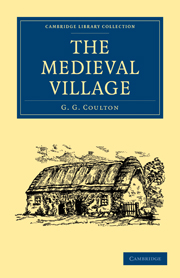Book contents
- Frontmatter
- GENERAL PREFACE
- AUTHOR'S PREFACE
- Contents
- LIST OF ILLUSTRATIONS
- ABBREVIATIONS AND AUTHORITIES
- CHAPTER I THE OPEN ROAD
- CHAPTER II VILLAGE DEVELOPMENT
- CHAPTER III A FEW CROSS-LIGHTS
- CHAPTER IV A GLASTONBURY MANOR
- CHAPTER V THE SPORTING CHANCE
- CHAPTER VI BANS AND MONOPOLIES
- CHAPTER VII THE MANOR COURT
- CHAPTER VIII LIFE ON A MONASTIC MANOR
- CHAPTER IX FATHERLY GOVERNMENT
- CHAPTER X THE LORD'S POWER
- CHAPTER XI EARLIER REVOLTS
- CHAPTER XII MONKS AND SERFS
- CHAPTER XIII THE CHANCES OF LIBERATION
- CHAPTER XIV LEGAL BARRIERS TO ENFRANCHISEMENT
- CHAPTER XV KINDLY CONCESSIONS
- CHAPTER XVI JUSTICE
- CHAPTER XVII CLEARINGS AND ENCLOSURES
- CHAPTER XVIII CHURCH ESTIMATES OF THE PEASANT
- CHAPTER XIX RELIGIOUS EDUCATION
- CHAPTER XX TITHES AND FRICTION
- CHAPTER XXI TITHES AND FRICTION (CONTINUED)
- CHAPTER XXII POVERTY UNADORNED
- CHAPTER XXIII LABOUR AND CONSIDERATION
- CHAPTER XXIV THE REBELLION OF THE POOR
- CHAPTER XXV THE REBELLION OF THE POOR (CONTINUED)
- CHAPTER XXVI THE DISSOLUTION OF THE MONASTERIES
- CHAPTER XXVII CONCLUSION
- APPENDIXES
- POSTSCRIPTS
- INDEX
- Plate section
CHAPTER XII - MONKS AND SERFS
Published online by Cambridge University Press: 06 December 2010
- Frontmatter
- GENERAL PREFACE
- AUTHOR'S PREFACE
- Contents
- LIST OF ILLUSTRATIONS
- ABBREVIATIONS AND AUTHORITIES
- CHAPTER I THE OPEN ROAD
- CHAPTER II VILLAGE DEVELOPMENT
- CHAPTER III A FEW CROSS-LIGHTS
- CHAPTER IV A GLASTONBURY MANOR
- CHAPTER V THE SPORTING CHANCE
- CHAPTER VI BANS AND MONOPOLIES
- CHAPTER VII THE MANOR COURT
- CHAPTER VIII LIFE ON A MONASTIC MANOR
- CHAPTER IX FATHERLY GOVERNMENT
- CHAPTER X THE LORD'S POWER
- CHAPTER XI EARLIER REVOLTS
- CHAPTER XII MONKS AND SERFS
- CHAPTER XIII THE CHANCES OF LIBERATION
- CHAPTER XIV LEGAL BARRIERS TO ENFRANCHISEMENT
- CHAPTER XV KINDLY CONCESSIONS
- CHAPTER XVI JUSTICE
- CHAPTER XVII CLEARINGS AND ENCLOSURES
- CHAPTER XVIII CHURCH ESTIMATES OF THE PEASANT
- CHAPTER XIX RELIGIOUS EDUCATION
- CHAPTER XX TITHES AND FRICTION
- CHAPTER XXI TITHES AND FRICTION (CONTINUED)
- CHAPTER XXII POVERTY UNADORNED
- CHAPTER XXIII LABOUR AND CONSIDERATION
- CHAPTER XXIV THE REBELLION OF THE POOR
- CHAPTER XXV THE REBELLION OF THE POOR (CONTINUED)
- CHAPTER XXVI THE DISSOLUTION OF THE MONASTERIES
- CHAPTER XXVII CONCLUSION
- APPENDIXES
- POSTSCRIPTS
- INDEX
- Plate section
Summary
Unmitigated serfdom has found no defenders; its misery is admitted, if only tacitly, on all hands; we have seen Imbart de la Tour confessing that it needed the progress of the later fifteenth century to transform the bondman into a real human being. But some men suggest tentatively, and a few have asserted dogmatically, that this improvement was due to the Church, and especially to the monasteries. Yet, whether timidly whispered in our ears or boldly proclaimed from the housetops, this thesis is never supported by the documentary evidence which alone, in the long run, could reconcile thinking people to such an historical paradox. For, on the face of it, the great centuries of serfdom were the great centuries of clerical, and especially of monastic, power. Again, those two or three generations of renascence, during which the serf, the rustic and the artisan bettered their condition very sensibly, resounded with complaints from great and orthodox Catholics that Mother Church had lost her former hold upon the people, and was steering straight for a religious revolution. Again, whereas England was the first great country to break with the medieval Church, she was also one of the least favourable to servitude. The same may be said of Holland; and, whatever social evils the Reformation unsettlement may have brought in its train—whatever, again, may have been the working of that capitalist movement which had begun long before, but which was accelerated by the Reformation—there is no great country whose poor were better off than the English, on the whole, between the Middle Ages and the French Revolution.
- Type
- Chapter
- Information
- The Medieval Village , pp. 140 - 150Publisher: Cambridge University PressPrint publication year: 2010First published in: 1925



